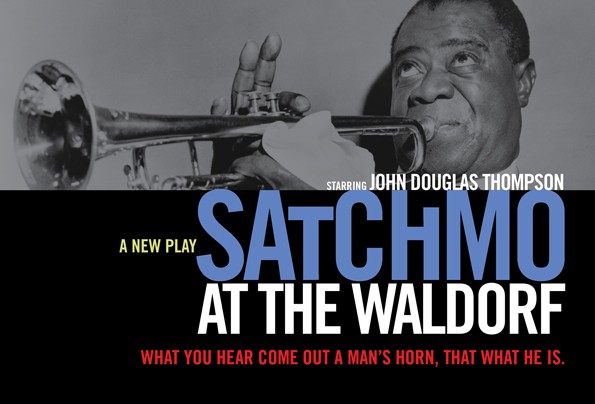“Writing is turning one’s worst moments into money.”
J.P. Donleavy (quoted in Playboy, May 1979)
Archives for 2012
TT: The bumpy road to truth
 Long Wharf Theatre has posted on its website an essay by me called “From Page to Stage.” I wrote it for the program of the New Haven transfer
Long Wharf Theatre has posted on its website an essay by me called “From Page to Stage.” I wrote it for the program of the New Haven transfer
of Satchmo at the Waldorf, which begins previews at Long Wharf on October 3:
Satchmo at the Waldorf takes place in March of 1971 in a dressing room backstage at the Empire Room of the Waldorf-Astoria Hotel in New York, where Armstrong performed in public for the last time four months before his death. Much of what he and Glaser say in the play derives from things that they said in real life, and the way in which both men talk on stage is an accurate portrayal of their habits of speech, right down to the last four-letter word. But the play is still a work of fiction, albeit one that is freely based on fact. It’s an attempt to suggest the nature of their personal relationship, which was so fraught with tension that no mere biographer, obliged as he is to stick to the factual record, could hope to do more than hint at its endless subtleties. Fictionalizing that relationship has freed me to speculate about things that I cannot know for sure but have good reason to suspect. Gordon Edelstein told me that Satchmo at the Waldorf is about “love–and betrayal.” As soon as he said it, I knew that he understood what I was trying to do….
Read the whole thing here.
TT: So you want to see a show?
Here’s my list of recommended Broadway, off-Broadway, and out-of-town shows, updated weekly. In all cases, I gave these shows favorable reviews (if sometimes qualifiedly so) in The Wall Street Journal when they opened. For more information, click on the title.
BROADWAY:
• Bring It On (musical, G, closes Jan. 20, reviewed here)
• Evita (musical, PG-13, reviewed here)
• Once (musical, G/PG-13, nearly all performances sold out last week, reviewed here)
OFF BROADWAY:
• Avenue Q (musical, R, adult subject matter and one show-stopping scene of puppet-on-puppet sex, reviewed here)
• The Fantasticks (musical, G, suitable for children capable of enjoying a love story, reviewed here)
• Tribes (drama, PG-13, closes Jan. 6, reviewed here)
IN NIAGARA-ON-THE-LAKE, ONTARIO:
• Misalliance (serious comedy, G/PG-13, far too talky for children, closes Oct. 27, reviewed here)
• Present Laughter (comedy, PG-13, closes Oct. 28, reviewed here)
CLOSING SOON IN EAST HADDAM, CONN.:
• Carousel (musical, G, closes Sept. 29, reviewed here)
CLOSING SATURDAY IN NIAGARA-ON-THE-LAKE, ONTARIO:
• French Without Tears (comedy, PG-13, reviewed here)
TT: Almanac
“There is no such thing as inner peace. There is only nervousness or death.”
Fran Lebowitz, “Manners”
TT: After the fact
 My mother died four months ago. I had to go back on the road a few days later, and since then I’ve been moving around pretty constantly. I feared–and still do–that being so busy might make it harder for me to absorb and accept the irreversible fact of her death. This was one of the reasons why I wrote the essay about the experience of watching a loved one die that I posted in this space in June. I started working on “The Long Goodbye” just two weeks after my mother’s funeral, hoping that the familiar act of writing might help me come to terms with the terrible spectacle that I had witnessed.
My mother died four months ago. I had to go back on the road a few days later, and since then I’ve been moving around pretty constantly. I feared–and still do–that being so busy might make it harder for me to absorb and accept the irreversible fact of her death. This was one of the reasons why I wrote the essay about the experience of watching a loved one die that I posted in this space in June. I started working on “The Long Goodbye” just two weeks after my mother’s funeral, hoping that the familiar act of writing might help me come to terms with the terrible spectacle that I had witnessed.
I read part of “The Long Goodbye” at the MacDowell Colony in June, and I was struck by the intensity with which my fellow colonists responded to what is, after all, a perfectly ordinary story. It didn’t occur to me until later that nearly all of them were younger than me, that the experience I described was one that they had not yet had, and that I might have succeeded in making it real to them by writing frankly and straightforwardly about something that most people prefer insofar as possible not to talk about at all.
Did it help me to write “The Long Goodbye”? I’m not so sure. It’s true that I’ve spent surprisingly little time brooding about my mother’s death, but that may well be because her final illness was so protracted and her suffering so great. I knew that it was time for her to go, and so, I feel certain, did she. When she died, I felt relieved.
 And how do I feel now? Again, I’m not sure. Of course I miss my mother–I adored her–but when I think of her now, I usually think of the last couple of years of her life, which were happy only at odd and increasingly infrequent intervals. It requires a powerful act of will for me to summon up the countless good times that came before. More than once I’ve reached reflexively for my cellphone while taking a cab to Times Square to see a Broadway show, telling myself that I’ll have just enough time to give her a quick call before I get to the theater. Mostly, though, I don’t think of her all that often, save in brief flashes. The veil, it seems, has descended.
And how do I feel now? Again, I’m not sure. Of course I miss my mother–I adored her–but when I think of her now, I usually think of the last couple of years of her life, which were happy only at odd and increasingly infrequent intervals. It requires a powerful act of will for me to summon up the countless good times that came before. More than once I’ve reached reflexively for my cellphone while taking a cab to Times Square to see a Broadway show, telling myself that I’ll have just enough time to give her a quick call before I get to the theater. Mostly, though, I don’t think of her all that often, save in brief flashes. The veil, it seems, has descended.
“You’ve wept enough,” Creon tells Oedipus in Sophocles’ Oedipus Rex. “Time is the great healer, you will see.” No doubt it is, and no doubt it is already doing its painstaking and necessary work. I’m not weeping anymore. I wonder whether I should be.
TT: Snapshot
The Paperwork Explosion, Jim Henson’s 1967 promotional film for the Magnetic Tape Selectric Typewriter, IBM’s first word processor. The electronic soundtrack was created by Henson and Raymond Scott:
(This is the latest in a series of arts-related videos that appear in this space each Monday and Wednesday.)
TT: Almanac
The Bustle in a House
The Morning after Death
Is solemnest of industries
Enacted upon Earth–.
Emily Dickinson, “The Bustle in a House”
TT: In memory of…
Dawn Upshaw, Hugh Wolff, and the St. Paul Chamber Orchestra perform Aaron Copland’s setting of Emily Dickinson’s “The World feels dusty”:
